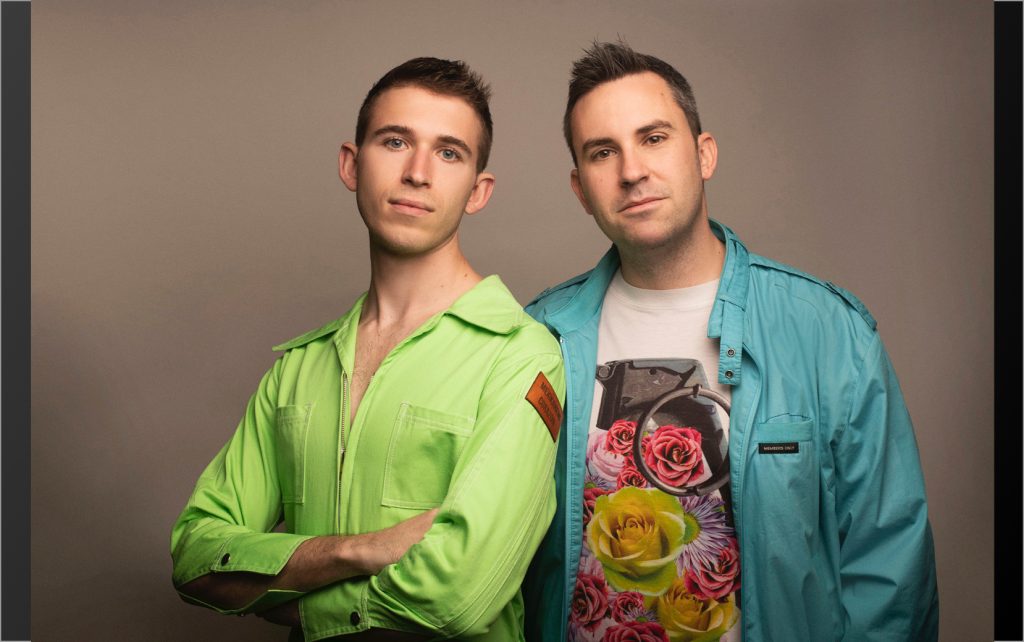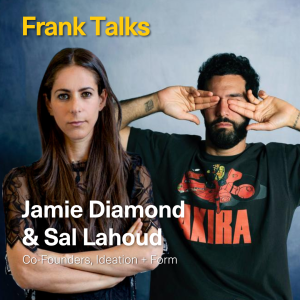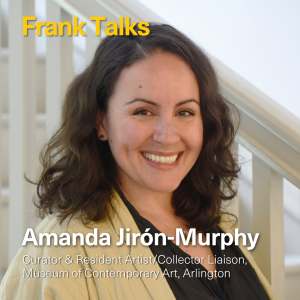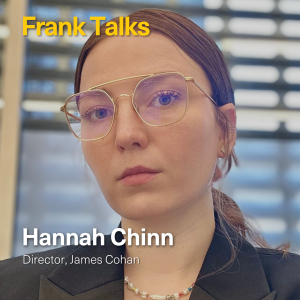This week we sit down with the Superfine! Art Fair founders Alex Mitow and James Miille. We are so thrilled to share their Frank Talk insights with you here and they have been kind enough to extend Art Frankly users and readers a 25% discount for tickets to their upcoming New York fair here: https://superfinenyc.
Dates And Times: Wed, May 1, 2019, 7:00 PM – Sun, May 5, 2019, 8:00 PM EDT
What was your first job in the Arts?
Alex: I suppose my first real job in the arts was actually as the founder and director of Superfine! However, before Superfine! Art Fair, I owned a company called FAME by Alex Mitow, which specialized in experiential events in the food, art, music, and events spheres (get it?) and I was essentially a curator of all of the above. I also owned a little gallery space on Allen Street in the Lower East Side and ran the catering cafés at SCOPE Art Show in New York. Through that, and meeting James, I really got my feet wet in art in a short time and quickly realized that the best way to effect change was through starting a fair.
James: My journey began as a photographer (I still am one!) back home in California, and then here in NYC. At the time, it was somewhere between a hobby and a job. I wasn’t selling much art, and what I was selling were prints ordered online, for $50 or so. I also did a short stint as an assistant to the photo editor at OUT Magazine. At the time I met Alex, he was doing his FAME thing and we decided to produce my first solo exhibition, where I really began to learn about the struggles facing emerging artists. Not long after, we started Superfine! together.
What was the most useful or important thing you learned at that job?
Alex: I learned to blaze your own trail, and that while you should take a moment to listen to others’ advice, you still have to make your own decisions. I think especially in art, you have to struggle to keep the “business” in “art business” since people will try constantly to steer you down all kinds of time and money wasting paths. I don’t think accountants have to deal with people sending nonstop emails about collaborations! At the same time, recognizing true opportunities for partnership is really important – you have to separate the wheat from the chuff, daily.
James: I learned about how important image and first impressions are. To build a successful art business – whether as an artist, a gallery, a fair, or any other platform – you have to really think about how you look to others. Would they buy your product? Just making something isn’t enough.
Tell us a little more about yourself. When did you realize you wanted to pursue a career in this industry?
Alex: I had always been in food, having owned restaurants for more than ten years by the time I seriously got into the arts. I also grew up in a restaurant family. My family is incredibly anal about how food looks, tastes, how it’s plated and served. I never realized that was a component of the visual arts until I began curating shows. I would say when I did the cafés at SCOPE in 2014 and 2015, I started to really see the industry as both viable and in need of a new injection of creative business thought.
James: As an artist, I’ve been making art for as long as I can remember. I didn’t think of it as a business but as I moved to New York and realized my talent for both creativity and organization were actually in demand, I started to consider my options. Meeting Alex was the catalyst that allowed both of us to really launch our careers with the fair.
What do you do now?
Alex: I’m the co-founder, director, and CEO of Superfine Industries LLC and our main product is the Superfine! Art Fair. We’ve hosted annual editions in New York, Miami, Washington DC, and Los Angeles, and are about to launch three new fairs (Chicago, San Francisco, and Seattle.) I’ve also branched out to freelance writing about art and business, and collecting both art and mid-century modern furniture.
James: I’m also the co-founder of Superfine Industries and the Superfine! Art Fair! My role has evolved from the creative director (which I still do) to the head of exhibitor sales and on-boarding for all of our fairs. On top of that I do my “art photography” which I exhibit at each Superfine! fair, and am also starting a more commercial photography business geared towards creating personal brand imagery for artists, actors, entrepreneurs, and anyone in need of “cool points” via the imagery they’re using. Basically, I’m very busy!
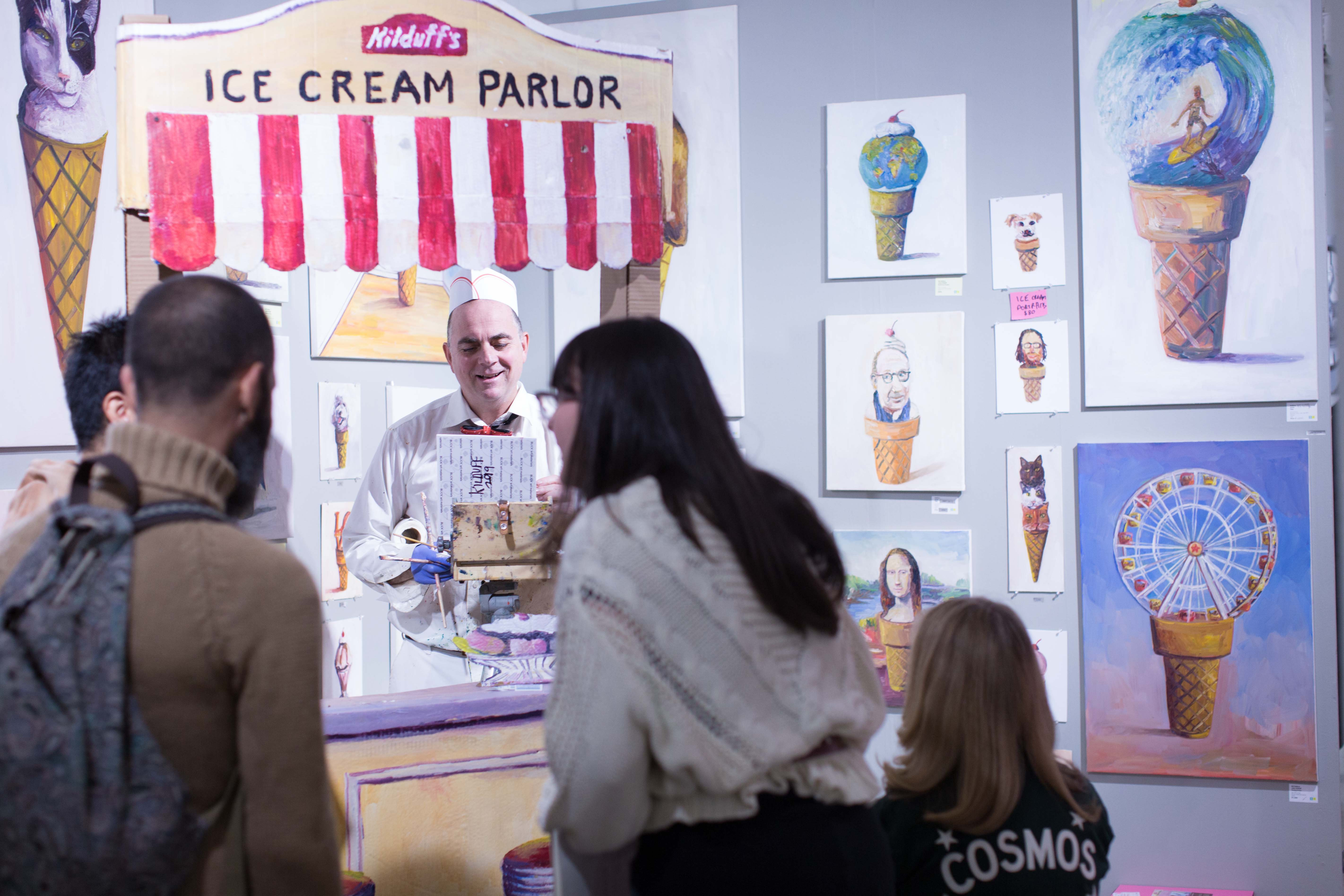
Where are you from?
Alex: You’ve never heard of it! A small town in West Central Florida (…but I usually just say Miami!)
James: Do you know Livermore, California?
What is the arts community like there?
Alex: I’d say where I’m from there are some artists, but they’re more like backyard artists painting on tin drums and people who do sailboat watercolors. Not that there’s anything wrong with that! It was never a scene I was involved in much growing up. However, I did spend an inordinate amount of time at the Dali Museum in St. Petersburg – every school field trip, family visit, or anything else. It’s no surprise that Dali was my favorite painter until I was in my 20s.
James: Back in Livermore, the art scene was minimal. Within my own high school, I was exploring different forms of art – theatre and photography mainly – with my peers, but I wouldn’t say there was much of an established art scene.
Has where you come from shaped what you do in the arts today?
Alex: Well, like I said I came from the restaurant industry back home. That gave me a sense of hospitality, something that I’ve instilled into all of my art enterprises as well. I think had I not had that background, I might still be in the arts but my perspective would be a little more run-of-the-mill, so I’m happy that I have a unique background.
James: It made me come to New York! Seriously, coming from a smaller, less cultural place is the driver for so many creative young people to come to NYC or other big cities, and I think in that way it was the catalyst propelling me forward.
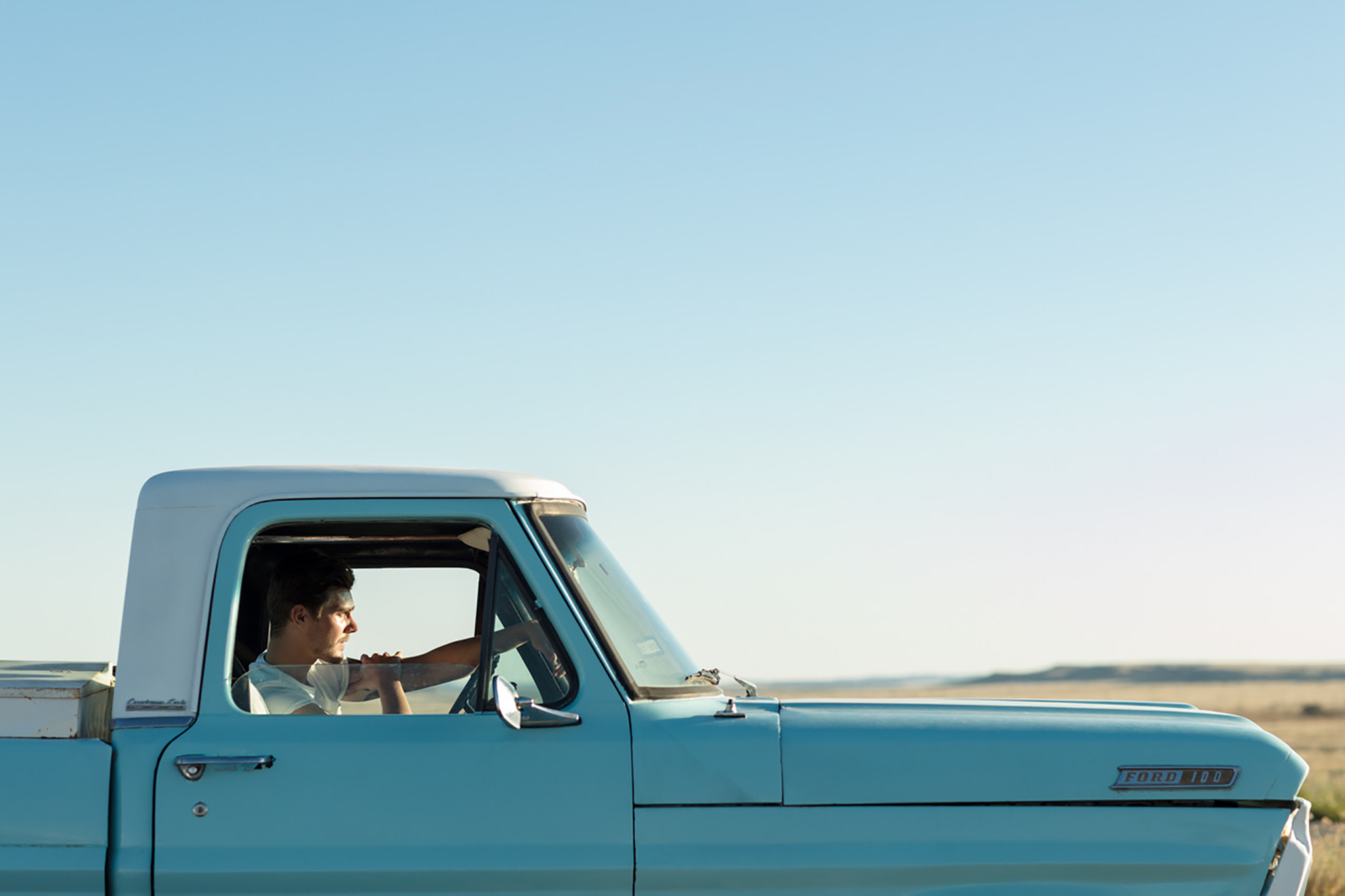
What is the best piece of advice you can give about working in the art world?
Alex: Think of it as a real business, and talk to people who’ve been extremely successful — or at least the level of success you see yourself at. Don’t base your life and decisions on the people around you who are failing, and sometimes you have to bring expectations to reality. Maybe you won’t be Warhol or Gagosian, but you can carve out a unique niche for yourself if you have an original idea (either art or business, or both!) that you can execute well and convince people is worth it.
James: Value yourself and be smart about your decisions. If you’re doing something because someone says you should for your “resume” or CV, re-think it immediately. Do what you love, what you actually feel is smartest, and learn to recognize what actually makes sense versus false opportunities. Not everything you pay for is a bad thing (think education) and not everything that’s free is a good thing.
What is one of your greatest accomplishments in your career so far?
Alex: Honestly, launching Superfine! in so many new cities.
James: Seeing success in multiple dimensions of art, both as an artist and an art entrepreneur. I like being the bridge between the two!
What has been a challenge for you?
Alex: I would’ve said gaining acceptance by the traditional art world a few years ago, but I no longer care. I really enjoy my work, what James and I do for artists and their champions, and the bridge we build for new collectors. That it’s able to sustain our lives is just a benefit, and I’m happy with that.
James: Ditto what Alex said!
What is something you do every day at work?
Alex: Send emails! Haha, honestly I’m trying to limit the amount of time behind a computer (and failing, as you can see!) but much of my time is spent managing the fair from top to bottom. Each fair is a 9 to 12 month lead-up, sometimes more if you count the announcement and venue search, so there’s always something to do.
James: I spend a lot of time researching artists and galleries I want to see in the fair. We’ve got an incredible marketing approach that establishes personas for each of our clients, so I focus on those personas and target prospective clients that fit them. Once I’ve got an idea of who I want to talk to, a lot of my time is spent explaining Superfine! and what makes us different as a fair.
What is one of the weirdest things you have had to do on the job in your career?
Alex: My weirdest things are sometimes playing the gopher at our fairs, since the rest of the staff is so busy. We’ll be an hour before opening and I’m checking out at IKEA, grabbing a cinnamon bun on the way out. I don’t think the collectors know that…
James: Help dolphins paint, and film it! Two years ago in Miami we partnered with Dolphins Plus Marine Mammal Rescue in Key Largo to present a fund-raising booth for their stranding rescue program. That entailed going down there, swimming with the dolphins, and helping them paint paintings with their rostrums.
What defines a good employee? What defines a good boss?
Alex: A good employee is a self-starter; someone who can take the lead and run with it, and communicate at the right times. A good boss is someone who manages and communicates clearly.
James: I would agree!
What do you think makes a person hirable?
Alex: Honestly, a big thing is following instructions off the bat. If I ask for something specific in a job post, and you don’t follow it or send me a canned email, I immediately disqualify you. I won’t even read the email if instructions aren’t followed.
James: Experience is not as important as people think. Everyone has to start somewhere and being quick and willing to learn is more important than how long you’ve done something. Especially with how much we all rely on technology today, you have to be willing to learn and then relearn almost everything, regularly.
What is your advice to making yourself stand out in your workplace?
Alex: Be incredibly consistent! Get tasks done. Especially in the arts, it can be difficult to find people accustomed to rigorous schedules and getting things done in a timely and complete manner. You’ll stand out just by how awesome you are. Once you’ve ticked that box, then you can start offering more original ideas and input which I’m sure your employer will then treasure greatly as they respect your work ethic.
James: Creative thinking is definitely important. You shouldn’t be hitting walls around every corner, and when you do you need to find a way to overcome them. Your employer hired you to take time off of their schedule, not add to it. When you think you can’t go any further, take a moment, take a breath, and see if there’s a way. They’ll notice those who find one, or at least get further.
What are things you can do proactively boost your CV?
Alex: For me it’s pretty simple. Work for good, prosperous, meaningful organizations. Work for and with people that really believe in you and that you pull all the stops to impress. Also, rather than loading up with tons of what I’d call “sub-skills” under one umbrella, I’d say develop major skills in different arenas. This automatically separates you from the rest of the herd. For instance, if you were an art curator *and* an accountant, you automatically become one of a very few versus one of very many, and you’re thus desirable to companies that need diversely trained employees.
James: I would say that in certain cases, it shows more initiative to just cut right through the red tape and do it yourself. If you’re a curator or artist and can’t find a gallery to work with you, just put on a show! Make sure it’s well covered and well photographed, and bam, you’ve got something. We also provide that opportunity for artists within Superfine!, with a built in crowd of thousands.
Are there any tips you can give people entering the workforce?
Alex: Differentiate yourself!
James: Take initiative, and follow through.
In your experience, what are things to do and things to avoid during an interview?
Alex:
Do: learn about the company, understand the role better, relate the role to your experience.
Don’t: talk only about yourself, share unrelated anecdotes or experiences that don’t relate to the job at hand, show up late.
James:
Do: show that you care and that you’re willing to learn.
Don’t: come off like you already know everything, because you probably don’t.
What is the best exhibition you have seen in the last year?
Alex: I actually really liked the David Bowie show at Brooklyn Museum. Maybe it’s because we’re listening to Bowie on repeat right now as I type this, but that show really stuck with me as a great merge of art and pop culture/rock stardom.
James: I loved CJ Hendry’s Rorschach show (it’s still up in DUMBO!) We got one of the lenticular prints when they went on sale yesterday, and the entire show is organized like a bounce house/psych ward hybrid. I really love that CJ defies art world conventions and puts on her own shows, and that they’re actually fun to be at.
If you could own a work by 5 different artists, who would be in your collection?
Alex: Oof, that’s a tough one. Off the top of my head I’d say Hernan Bas, Lou Fratino, and I’d love another piece by Naruki Kukita (we already own one!)
James: I’d love a piece from Justin Yoon (he’s actually in our New York fair), Mark Beard (we’ve got a drawing but I’d love a painting!), and Devan Shimoyama.
